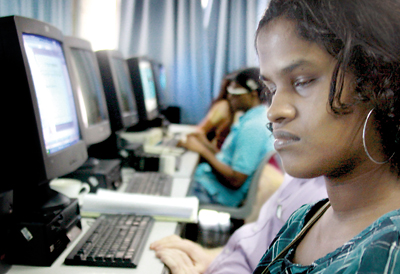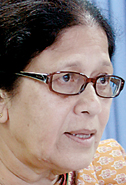Out of darkness and into the path of success
View(s):Looking at her vision impairment in a different light and motivated by determination, Manique Gunaratne now teaches computer studies to others. This is a story of inspiration
By Kumudini Hettiarachchi and Shaveen Jeewandara
Clad in a purple Kandyan saree with perfectly matching accessories, pretty Manique Gunaratne is teaching a computer class. She moves about her students confidently, making them feel comfortable and at ease.
She lives by the four Ds, she smiles in answer to our curious questions as to how she has achieved so much. They are the Dream to be a role model; followed by the Desire, the Determination and the Discipline to achieve it.

Students in Manique’s class. Pix by M.A. Pushpa Kumara
Manique is visually-impaired. Having had perfect vision till 2000, the deterioration beginning with myopia (short-sightedness) had set in during her youth, making it difficult for her to overcome her disability. She is a victim of the incurable Retinitis Pigmentosa an inherited, degenerative disease in which the retina or the light-sensitive layer of tissue at the back of the inner eye is damaged. Present from birth, this disease which affects both eyes, manifests itself only at a later stage in life leading to blindness.
Now not only has she overcome her disability but also achieved much more, standing tall as a beacon of hope and triumph. As part of the Employers’ Federation of Ceylon (EFC), Manique’s task these days is to impart her knowledge and skills of information technology to other visually-impaired men and women so that they would be able to stand on their own feet and contribute their part to society.
Having undergone her primary and secondary education at St. Bridget’s Convent, Manique was just not ready to give up her studies though her sight was failing, she tells us going back to her youth. Mastering the art of Braille as well as the use of the white cane, she had taken up the study of information technology in the form of JAVA Application Development at the Colombo University and Digital Accessible Information System (DAISY) at the Sri Jayewardenepura University. Later she had embraced wholeheartedly the opportunity afforded by the EFC to work there from October 15, 2001, coincidentally International White Cane Day. It was as a trainee that she had joined, moving on to handle the reception, then the telephone system, finally being absorbed as a permanent employee.
“I looked at my impairment in a different light,” says Manique, explaining that she wanted to be financially and professionally independent and stable while encouraging others to follow suit by becoming a role model, both locally and internationally.
Her quest has not been without its challenges, she concedes, pointing out that being visually-impaired and also a woman “make it doubly difficult”. Sheer courage and determination have pulled her through not only making her travel across Sri Lanka but also abroad firstly to specialise in IT in Japan, India and Thailand and then to attend high-level conferences.
With numerous visits abroad, all on her own, she is quick to point out the three main problems surrounding those with disabilities in Sri Lanka as the negative public attitude towards them and the lack of education and vocational training.
Manique who lives alone and comes to work on her own also laments the lethargy in introducing facilities to provide accessibility to buildings etc for people with disabilities. While this is a major shortcoming, according to her, another big issue is stigma which follows in its wake.
Not content to lie on the many awards, laurels and leadership roles showered on her including the selection as Vice Chairperson of the South Asia Disability Forum; Member of the Advisory Board of the International Solidarity Fund for Women with Disability; and ‘Diriya Kanthawa of 2007; Manique wants to empower others.
Currently she trains the visually impaired, ranging from graduates to job-seekers to university students and those already employed in IT, some of whom have “not even seen a computer”.
To our puzzled queries, she replies that “the training is done by voice commands”, one software of which, a low-cost feasible solution, was installed by Manique herself.
It is important for the visually-impaired to keep their heads up, following the voices of others than looking down, bowed by their disability, she says, urging them to project a positive image.
Her philosophy is a rights-based and not a charity-based approach when dealing with people with disabilities.
“I want all citizens to change their views from sympathy to empathy, from dependence to independence, hidden to open, segregation to integration and exclusion to inclusion,” says Manique, reiterating that it should always be the “we and definitely not the me” concept that should be followed.
EFC: Taking their vision to the northeast
The EFC extended the services of its IT Training Centre to Vavuniya last year with the support of the International Labour Organization (ILO), for the benefit of the visually-impaired in the north, said EFC’s Head of Plantation Services and Attorney-at-Law Meghamali Aluwihare.

Meghamali Aluwihare
It had been back in 2000 that the EFC formed the Employers’ Network on Disability with assistance from the ILO to promote its vision of productive employment through social harmony, setting up the IT Training Centre for Visually-Impaired Persons.
Citing the success story of Manique Gunaratne, Ms. Aluwihare mentions how she benefited from the EFC’s programmes and is now very much a part of the centre in promoting the development of people with disabilities through information technology courses. Already 135 visually-impaired people have undergone these courses.
The centre is registered with the Tertiary and Vocational Education Commission and the EFC is hoping to spread the IT training opportunities to other areas of the north and east as well, she said.
The EFC is a trade union for employers, which has been in the forefront of labour-related issues, industrial relations and human resource training since 1929, says Ms. Aluwihare, pointing out that it now has 550 employer-members, who have more than 450,000 employees in the plantation, tourism, manufacturing and garment industries.
Joining hands with the Ministries of Social Services and Labour and NGOs, the EFC’s Network on Disability has not only trained those with disabilities but also held employment fairs for them to secure productive jobs. Over the years, more than 350 people with disabilities have found employment with top corporates such as John Keells, IDL Lanka, CEI Plastics, Cargills and several leading banks.
It is estimated that about 10% of the population have disabilities and among adults with disabilities about 84% are unemployed.
Follow @timesonlinelk
comments powered by Disqus


















